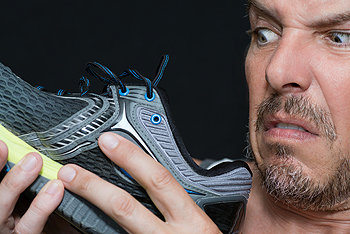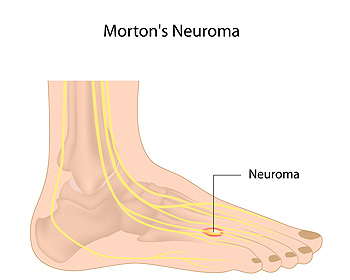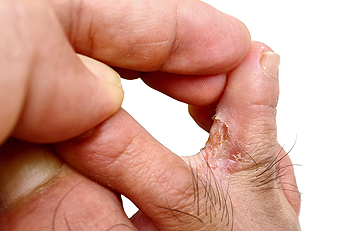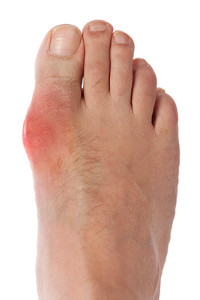Items filtered by date: July 2018
What Causes Plantar Hyperhidrosis?
 If you are experiencing excessive sweating of the feet, you may have an uncomfortable condition that is referred to as plantar hyperhidrosis. Research has shown that a cause for this ailment to occur may be a nervous system that is overactive. Other foot conditions may develop as a result of plantar hyperhidrosis, and these may include the formation of painful blisters and athlete’s foot, in addition to a foul odor coming from the feet. It may be hazardous to perform any type of martial arts, exercise, or dance routine, which may possibly cause wet spots to form on the mats, that are typically used. It may cause falling to occur easily, which may lead to serious injuries. Please schedule a consultation with a podiatrist if you are afflicted with plantar hyperhidrosis of the feet and would like additional information.
If you are experiencing excessive sweating of the feet, you may have an uncomfortable condition that is referred to as plantar hyperhidrosis. Research has shown that a cause for this ailment to occur may be a nervous system that is overactive. Other foot conditions may develop as a result of plantar hyperhidrosis, and these may include the formation of painful blisters and athlete’s foot, in addition to a foul odor coming from the feet. It may be hazardous to perform any type of martial arts, exercise, or dance routine, which may possibly cause wet spots to form on the mats, that are typically used. It may cause falling to occur easily, which may lead to serious injuries. Please schedule a consultation with a podiatrist if you are afflicted with plantar hyperhidrosis of the feet and would like additional information.
If you are suffering from hyperhidrosis contact Dr. Steven Sheridan of Ankle & Foot Specialty Clinics. Our doctor can provide the care you need to attend to all of your foot and ankle needs.
Hyperhidrosis of the Feet
Hyperhidrosis is a rare disorder that can cause people to have excessive sweating of their feet. This can usually occur all on its own without rigorous activity involved. People who suffer from hyperhidrosis may also experience sweaty palms.
Although it is said that sweating is a healthy process meant to cool down the body temperature and to maintain a proper internal temperature, hyperhidrosis may prove to be a huge hindrance on a person’s everyday life.
Plantar hyperhidrosis is considered to be the main form of hyperhidrosis. Secondary hyperhidrosis can refer to sweating that occurs in areas other than the feet or hands and armpits. Often this may be a sign of it being related to another medical condition such as menopause, hyperthyroidism and even Parkinson’s disease.
In order to alleviate this condition, it is important to see your doctor so that they may prescribe the necessary medications so that you can begin to live a normal life again. If this is left untreated, it is said that it will persist throughout an individual’s life.
A last resort approach would be surgery, but it is best to speak with your doctor to find out what may be the best treatment for you.
If you have any questions please feel free to contact our office located in Sandusky, MI . We offer the newest diagnostic and treatment technologies for all your foot and ankle needs.
Symptoms of Morton’s Neuroma
 An inflamed nerve that is found below the big toe is often referred to as Morton’s neuroma. Symptoms that may be experienced can include a sharp pain on the bottom of the foot, which may often be accompanied by a burning sensation. Some patients may complain of a tingling sensation or numbness, which may spread to other toes. Walking may become difficult because of the pain that is increased as a result of normal pressure that is exerted on the ball of the foot. A possible cause for this condition to develop may often be associated with wearing shoes that fit too tightly around the middle of the foot, often forcing the patient to limp or to stop walking. Research has shown that relief may be found by gently massaging the foot, wearing shoes that fit properly, or having surgery performed in severe cases. It’s suggested to consult with a podiatrist for a proper diagnosis, in addition to learning about the best options for treatment.
An inflamed nerve that is found below the big toe is often referred to as Morton’s neuroma. Symptoms that may be experienced can include a sharp pain on the bottom of the foot, which may often be accompanied by a burning sensation. Some patients may complain of a tingling sensation or numbness, which may spread to other toes. Walking may become difficult because of the pain that is increased as a result of normal pressure that is exerted on the ball of the foot. A possible cause for this condition to develop may often be associated with wearing shoes that fit too tightly around the middle of the foot, often forcing the patient to limp or to stop walking. Research has shown that relief may be found by gently massaging the foot, wearing shoes that fit properly, or having surgery performed in severe cases. It’s suggested to consult with a podiatrist for a proper diagnosis, in addition to learning about the best options for treatment.
Morton’s neuroma is a very uncomfortable condition to live with. If you think you have Morton’s neuroma, contact Dr. Steven Sheridan of Ankle & Foot Specialty Clinics. Our doctor will attend to all of your foot care needs and answer any of your related questions.
Morton’s Neuroma
Morton's neuroma is a painful foot condition that commonly affects the areas between the second and third or third and fourth toe, although other areas of the foot are also susceptible. Morton’s neuroma is caused by an inflamed nerve in the foot that is being squeezed and aggravated by surrounding bones.
What Increases the Chances of Having Morton’s Neuroma?
- Ill-fitting high heels or shoes that add pressure to the toe or foot
- Jogging, running or any sport that involves constant impact to the foot
- Flat feet, bunions, and any other foot deformities
Morton’s neuroma is a very treatable condition. Orthotics and shoe inserts can often be used to alleviate the pain on the forefront of the feet. In more severe cases, corticosteroids can also be prescribed. In order to figure out the best treatment for your neuroma, it’s recommended to seek the care of a podiatrist who can diagnose your condition and provide different treatment options.
If you have any questions, please feel free to contact our office located in Sandusky, MI . We offer the newest diagnostic and treatment technologies for all your foot care needs.
How to Prevent Corns on the Feet
 A formation of a corn is typically the result of excessive pressure inflicted on the toes from poorly fitting shoes. It generally consists of a small round area of thickened skin that appears to be white. Hard corns may develop on the outside of the toes, as a result of consistent friction caused by shoes that are too tight. As they press into the layers of the skin, they often produce pain and discomfort. Another type of corn is referred to as a soft corn, and generally forms between the toes as a result of the moisture that exists there. Severe corns may be trimmed by a podiatrist, which may initiate relief. Prevention of corns may start with properly sizing the feet so the correct size shoes can be purchased. It’s imperative to consult with a podiatrist who can suggest methods for alleviating the pain and discomfort associated with corns.
A formation of a corn is typically the result of excessive pressure inflicted on the toes from poorly fitting shoes. It generally consists of a small round area of thickened skin that appears to be white. Hard corns may develop on the outside of the toes, as a result of consistent friction caused by shoes that are too tight. As they press into the layers of the skin, they often produce pain and discomfort. Another type of corn is referred to as a soft corn, and generally forms between the toes as a result of the moisture that exists there. Severe corns may be trimmed by a podiatrist, which may initiate relief. Prevention of corns may start with properly sizing the feet so the correct size shoes can be purchased. It’s imperative to consult with a podiatrist who can suggest methods for alleviating the pain and discomfort associated with corns.
If you have any concerns regarding your feet and ankles, contact Dr. Steven Sheridan of Ankle & Foot Specialty Clinics. Our doctor will treat your foot and ankle needs.
Corns: What Are They? and How Do You Get Rid of Them?
Corns can be described as areas of the skin that have thickened to the point of becoming painful or irritating. They are often layers and layers of the skin that have become dry and rough, and are normally smaller than calluses.
Ways to Prevent Corns
There are many ways to get rid of painful corns such as wearing:
- Well-fitting socks
- Comfortable shoes that are not tight around your foot
- Shoes that offer support
Treating Corns
Treatment of corns involves removing the dead skin that has built up in the specific area of the foot. Consult with Our doctor to determine the best treatment option for your case of corns.
If you have any questions please feel free to contact our office located in Sandusky, MI . We offer the newest diagnostic and treatment technologies for all your foot and ankle needs.
Are Certain People Susceptible to Gout Attacks?
 Gout is caused by an excess of uric acid that typically collects in the joints of the big toe. This commonly causes severe pain as a result of the inflammation around the big toe and surrounding areas. The majority of people who are afflicted with gout have a condition that is referred to as under-excretors, which is the inability to eliminate excess uric crystals from the urine. People who may be affected with this are diabetics and patients who may be obese or have heart disease. When certain types of foods are ingested, gout attacks may be more likely to occur. These may include shellfish, red meat or excessive alcohol. In severe and frequent gout attacks, small crystals may form in the kidneys, which may gradually increase in size to become kidney stones. If you have pain in your big toe and it appears to be red and tender, you may be experiencing a gout attack. It’s suggested to consult with a podiatrist as quickly as possible to discuss the best treatment options for you.
Gout is caused by an excess of uric acid that typically collects in the joints of the big toe. This commonly causes severe pain as a result of the inflammation around the big toe and surrounding areas. The majority of people who are afflicted with gout have a condition that is referred to as under-excretors, which is the inability to eliminate excess uric crystals from the urine. People who may be affected with this are diabetics and patients who may be obese or have heart disease. When certain types of foods are ingested, gout attacks may be more likely to occur. These may include shellfish, red meat or excessive alcohol. In severe and frequent gout attacks, small crystals may form in the kidneys, which may gradually increase in size to become kidney stones. If you have pain in your big toe and it appears to be red and tender, you may be experiencing a gout attack. It’s suggested to consult with a podiatrist as quickly as possible to discuss the best treatment options for you.
Gout is a painful condition that can be treated. If you are seeking treatment, contact Dr. Steven Sheridan from Ankle & Foot Specialty Clinics. Our doctor will treat your foot and ankle needs.
What Is Gout?
Gout is a form of arthritis that is characterized by sudden, severe attacks of pain, redness, and tenderness in the joints. The condition usually affects the joint at the base of the big toe. A gout attack can occur at any random time, such as the middle of the night while you are asleep.
Symptoms
- Intense Joint Pain - Usually around the large joint of your big toe, and it most severe within the first four to twelve hours
- Lingering Discomfort - Joint discomfort may last from a few days to a few weeks
- Inflammation and Redness -Affected joints may become swollen, tender, warm and red
- Limited Range of Motion - May experience a decrease in joint mobility
Risk Factors
- Genetics - If family members have gout, you’re more likely to have it
- Medications - Diuretic medications can raise uric acid levels
- Gender/Age - Gout is more common in men until the age of 60. It is believed that estrogen protects women until that point
- Diet - Eating red meat and shellfish increases your risk
- Alcohol - Having more than two alcoholic drinks per day increases your risk
- Obesity - Obese people are at a higher risk for gout
Prior to visiting your podiatrist to receive treatment for gout, there are a few things you should do beforehand. If you have gout you should write down your symptoms--including when they started and how often you experience them, important medical information you may have, and any questions you may have. Writing down these three things will help your podiatrist in assessing your specific situation so that he or she may provide the best route of treatment for you.
If you have any questions, please feel free to contact our office located in Sandusky, MI . We offer the newest diagnostic and treatment technologies for all your foot care needs.
